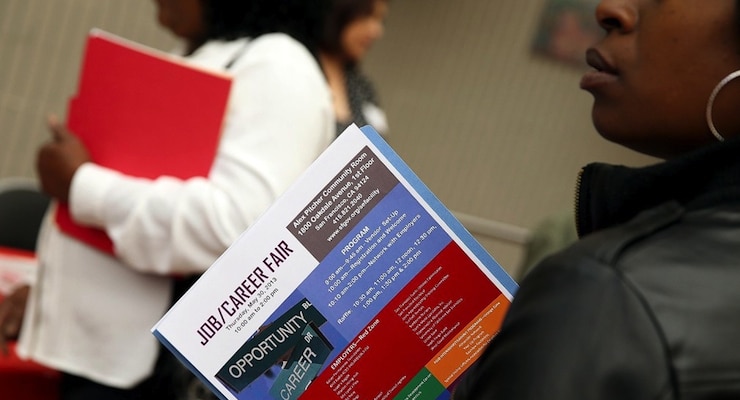

SAN FRANCISCO, CA – MAY 30: A job seeker holds a pamphlet during a job and career fair at City College of San Francisco southeast campus on May 30, 2013 in San Francisco, California. Hundreds of job seekers attended a career fair hosted by the San Francisco Southeast Community Facility Commission. (Photo by Justin Sullivan/Getty Images)
In the mythology of the right, California must fail. Its high taxes, strict environmental rules and thick book of regulations are all ingredients in the conservative recipe for economic meltdown. That California is prospering nicely throws a pie in the face of its harshest critics.
To get around this clash of ideas and reality, an alternative version of California-going-down has been created. It is built on cherry-picked facts, numbers out of context and anecdotes. And the right continues churning out stories of companies “fleeing” California.
The conservative City Journal has devoted its winter issue to what’s wrong with California. One piece accuses “coastal elites” of destroying drought-plagued almond farmers by “privileging the needs of fish over the needs of people.” (What the fish need is a minimum water flow to their habitats to save them from extinction.)
Not to mess up a sweet fairy tale, but the “coastal elites” and the farmers are often one and the same people. The largest producer of nuts in the state is a company owned by Beverly Hills billionaires Lynda and Stewart Resnick. Hedge funds and banks have also gotten into the almond game, now that a lucrative Asian market has sent nut prices soaring. Thus, in the jaws of a multiyear drought, California “farmers” continue to plant water-gulping almond trees.
What else is wrong with California? A state minimum wage raised to $10 an hour from $9. That Wal-Mart is raising wages to $10 nationwide should offer a hint that $10 an hour is not extraordinarily high.
Zoning and environmental regulations have made California real estate quite expensive, especially along the coast. This is true, although having the Pacific Ocean on a long border hampers development, as well.
One reason zoning and environmental regulations make real estate more expensive is they also make it more desirable. One shouldn’t have to explain this to The Wall Street Journal, but one does after reading its commentary about “the mismatch between supply and demand” in California housing prices.
Actually, supply and demand don’t match or mismatch. Supply is supply, and demand is demand. When demand rises faster than supply, prices rise. That’s the law of supply and demand working as it’s supposed to.
The writer is obviously trying to say that imposing high standards for preserving the quality of life causes housing costs to rise. OK. Those who can’t pay the price — or who want bigger spaces — can and often do consider other parts of the country.
Though the decisions by Toyota and Occidental Petroleum to transfer their headquarters to Texas may energize California’s critics, they represent narrow slices of a bigger picture. A new study from Beacon Economics and Next 10 shows that California remains a powerhouse in attracting companies and well-to-do people.
In 2013, California ranked fourth in job creation by new businesses and fifth in creation of new businesses (a growth rate of 5.5 percent). From 2007 to 2014, 49,000 more people with a bachelor’s degree moved into the state from other states than moved out.
So is California an easy place in which to do business? It’s not. Is it a paradise for less skilled workers? Sadly, no. Few places are these days.
What the strong numbers do mean, Beacon partner Chris Thornberg told the Los Angeles Times, is “that being ‘business friendly’ is not the be-all and end-all of economic development.” He went on: “When you actually look at the data, you’ll find that as kooky as California is, it’s not a state that’s underperforming.”
Let the critics carp. But do correct them.


